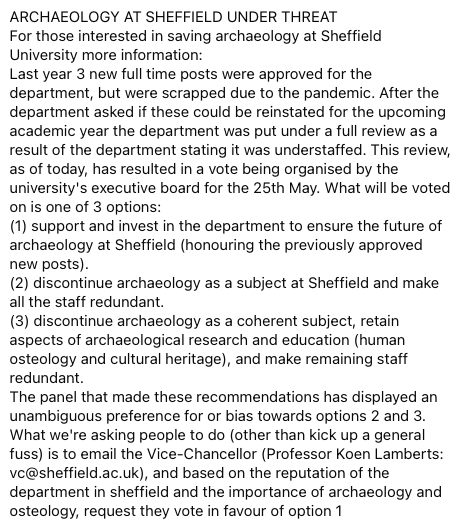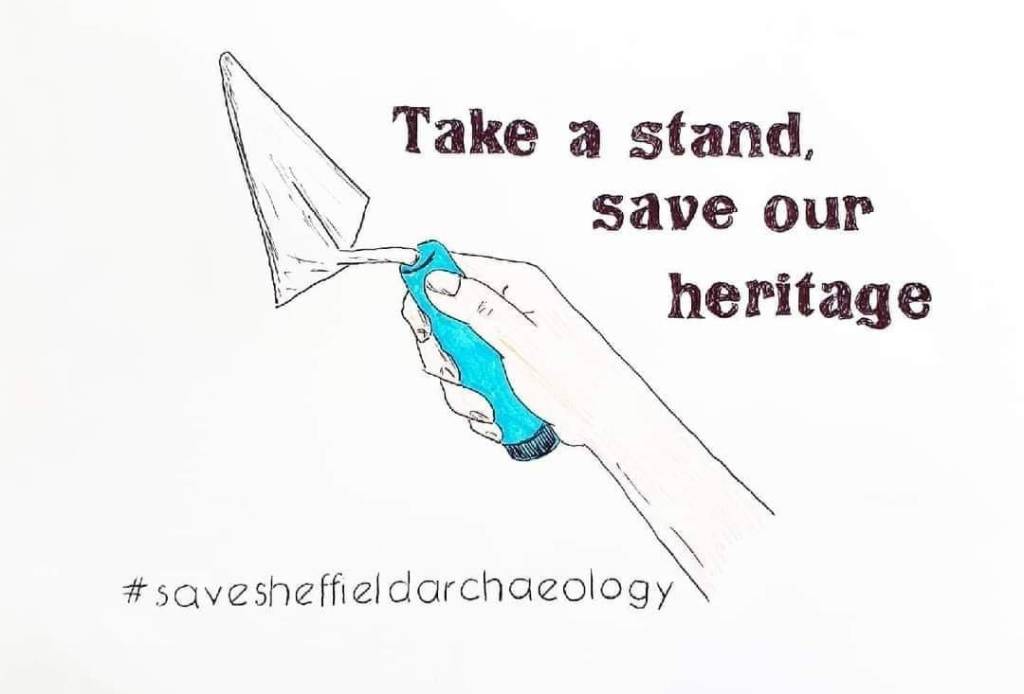There is much to say and much too little time to say it all in, so let me cut to the quick – the world-class archaeology department at the University of Sheffield is at risk of closure and the staff at risk of redundancy. The results of a recent departmental review by the University of Sheffield is due Tuesday 25th May, along with a vote by the University Executive Board on the future of the department.
I found this out last night as a friend alerted me to the following screenshot:
I was guided also to the Save Sheffield Archaeology, which has further details on the departmental review and the importance of the archaeology department to the city and the academic community internationally. Most importantly it is the jobs that are at risk – the academic, postdocs, researchers and administrative staff, who all potentially face the risk of redundancy. As far as I currently understand the department itself is still fragmented physically as both lectures and staff are based across the University of Sheffield departments as the archaeology building itself is (or has been) undergoing much-needed structural repairs. Despite this, and the ongoing Covid-19 pandemic, teaching and research have still continued and student support has still been given.
You can help by reading the links below, searching out what other people and saying and what Saving Sheffield Archaeology are advising. If you are an archaeologist or know the department in any way – used to work there, studied there, are affiliated with it in any way, etc. – and are concerned for its future as I am, then please do sign the Change.org petition, email the VC and the University Executive Board, and make your voice known.
The decision on the future of the archaeology department at the University of Sheffield will be made on Tuesday 25th May. Stay tuned.
Bigger Issues
Readers of my blog will know that I attended the University of Sheffield in 2011-12 to study for my MSc in Human Osteology and Funerary Archaeology and reveled in the teaching, research and personal development opportunities that the course offered. I have friends who have studied there since and remain affiliated with the department. I am worried, I am concerned, and I will be writing to the VC and the University Executive Board with my concerns at their reviews and the three stated options available to it. I am deeply concerned at what appears to be an unforced and perhaps manufactured issue in staffing (not replacing retiring staff, which has seen current teaching staff drop from 29 to 11) and the longer-term trends of higher education being pulled in two different directions – between the demands of the market and the demands of providing, and supplying, quality education for all and the benefits of this for society and the economy. A third pressure has also made itself know in recent years at the United Kingdom of Great Britain and Northern Ireland wrestles control with its own myriad of identities.
HM Government have recently announced that it is considering cutting high-cost teaching supplement for undergraduate arts and archaeology courses by up to 50% in favour of more funding for STEM subjects, this along with the Government’s stated aim of simplifying planning permissions to encourage house building and infrastructure projects, puts archaeology and the archaeological record at possible risk as statutory consents are sidelined. Conversely the archaeology jobs sector has rarely been busier, with many major projects ongoing utilizing a range of archaeological specialisms, from drone operators to archaeological geomatics, from field staff to human osteologists, etc. One only needs to think of HS2 or Crossrail or road infrastructures projects in eastern England to think of how many archaeologists are currently employed in varying roles and positions. In fact archaeologists are on the Skilled Worker visa: shortage occupations for April 2021, the only social and humanities scientists category to make it.
It is a worrying time for ease of access to archaeological courses in higher education, as tuition fees remain high and are climbing for postgraduate study and research. One effect of Brexit is the annulment of EU fees category remaining the same as home fees for students and instead becoming aligned with international fees. This has a severe impact for those nearest and dearest European neighbours. For instance the 2021 MSc in Human Osteology and Funerary Archaeology tuition fee at the University of Sheffield is now priced at £11,000 for home students and £23,250 for overseas students. This is a staggering sum for higher education and one well out of the reach for many. I raise this point as archaeology in particular has a strong pull for bringing together international students and researchers, and Sheffield’s department is well known for its ties across Europe and the wider world. Fees such as this are just one more barrier to cross.
Archaeology as a topic unto itself is broad, welcoming and diverse – whoever and wherever you are, you too came from somewhere and within that is the story of ultimately both your past and mine. Archaeology is the investigation into the great human story and the department at Sheffield is one such place where we can view it. How sad it would be to see a portal on the past close.
How to Help
- As above email the Vice-Chancellor at vc@sheffield.ac.uk and the executive board in general at ueb-admin@sheffield.ac.uk to let them know your views on why the archaeology department at the University of Sheffield should be saved. Include the archaeology department (archaeology@sheffield.ac.uk) to let them know of your support
- Sign the Change.org petition here
- Read up on the Save Sheffield Archaeology Resources homepage and see how else you can help
- Search for the hashtag #SaveSheffieldArchaeology on Twitter to see what archaeologists, researchers, students and the public are saying
- Keep up to date with the Save Sheffield Archaeology Facebook page
- Read what the press are saying here – Yorkshire Post, Sheffield Telegraph, and The Star



If you look on Google Earth at the semi-detached houses which form 108/110 Racecourse Road, Swinton S64 8DR they are bisected by an ancient trackway ‘Scorah’s Lane which runs from the ancient Roman Rig Dyke from Rig Drive NNE towards Bolton on Dearne.
I recall some time ago visiting a history group presentation in Wath-upon-Dearne where aerial pictures (long before the days of drones) showing in the fields immediately behind these semis directly on the line of the ancient trackway a rectangular crop mark about the size of a soccer pitch. It was suggested at the time this may be one of the lost “Manor Houses’ under he auspices of Wath-upon-Dearne – I would be grateful if you had any information/references to this locatiom